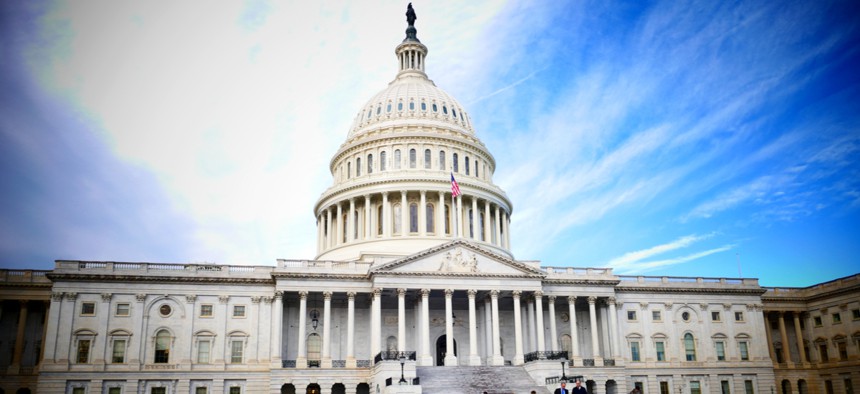IT Modernization Bill Clears Senate as Part of Defense Authorization Bill

The Capitol Hill Building in Washington, D.C. Golden Brown/Shutterstock.com
The OPEN Government Data Act also advances, along with other tech and cyber goodies.
The Modernizing Government Technology Act—and several other tech amendments—passed the Senate as part of the annual defense appropriations bill.
The $700 billion National Defense Authorization Act, which sets defense personnel, policy and spending, passed by a vote of 89 to 8 Monday evening.
Sens. Jerry Moran, R-Kan., and Tom Udall, D-N.M., introduced the MGT Act as amendment 1006—one of hundreds lawmakers parsed through. MGT Act creates a $500 million central modernization fund over two years agencies can borrow against to update aging, unsecure systems. It also creates working IT capital funds that agencies can stash savings from other modernization projects—like migrating to cloud computing—to use for future projects.
“Senate passage of the Modernizing Government Technology Act is a major step forward in our goal of creating a more cost-efficient and digitally secure federal government,” House Majority Leader Kevin McCarthy, R-Calif., said in a statement. “By leveraging new technologies, we will save taxpayers money and deliver a well-overdue update to our nation’s IT systems.”
The House version, introduced by Rep. WIll Hurd, R-Texas, passed as a standalone bill in May, had the backing of the White House’s Office of American Innovation and many industry groups, but had yet to make it on the Senate calendar.
“The Senate’s actions take us closer to enactment, which will provide a dedicated funding stream for federal agencies to harness new technologies, reduce government costs and vulnerabilities, and improve efficiency and performance. We look forward to enactment of the MGT Act by Congress," said Alan Chvotkin, executive vice president and counsel of PSC, in a statement.
Another bipartisan tech effort also made it through: the Open, Public, Electronic and Necessary Government Data Act. The bill by Sen. Ben Sasse, R-Neb., and Brian Schatz, D-Hawaii, mandates the federal data housed on Data.gov is machine-readable and easily searchable by default. Federal agencies also are supposed to use the data for their own decision-making processes. The Senate version incorporated some recommendations from the Office of Management and Budget, according to the Data Foundation.
"Our OPEN Government Data Act is simple: government data should be made public unless an administration can make a compelling reason to keep it under wraps. This legislation passed the Senate last Congress and, with tonight’s passage, I’m glad to carry the momentum forward," Sasse said in a statement.
The NDAA also includes a provision to expand the pipeline of potential government cybersecurity workers. It includes Cyber Scholarship Opportunities Act, sponsored by Sens. Tim Kaine, D-Va., and Roger Wicker, R-Miss., which expands a National Science Foundation cybersecurity scholarship program to include scholarships for students in community colleges. The scholarships are typically offered in exchange for future government service.
The defense authorization bill also doles out some homework. Congress wants the Defense Secretary, for example, to serve up reports on the effectiveness of a cyber deterrence doctrine, a plan to increase the cyber workforce of the armed forces’ reserve units, and how blockchain may be implemented in the department’s offensive and defensive cyber operations. The Small Business Administrator would also need to determine how the Budget Control Act, aka sequestration, may be affecting small businesses on multiple award contracts.
The legislation next heads to conference to reconcile the differences with the House version.
NEXT STORY: GSA Shakes Up Federal Acquisition Leadership






